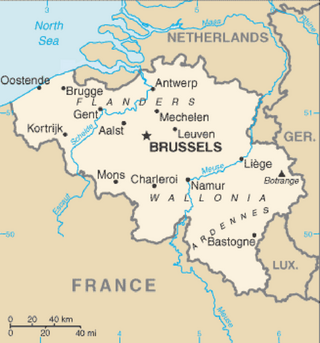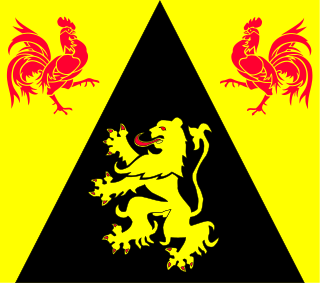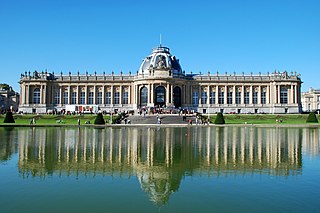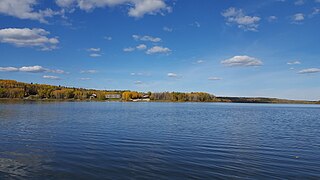Brabant is a traditional geographical region in the Low Countries of Europe. It may refer to:

Belgium is a federal state located in Western Europe and is divided into three regions: the Flemish Region (Flanders), the Walloon Region (Wallonia), and the Brussels Capital Region (Brussels).

Flemish Brabant is a province of Flanders, one of the three regions of Belgium. It borders on the Belgian provinces of Antwerp, Limburg, Liège, Walloon Brabant, Hainaut and East Flanders. Flemish Brabant also surrounds the Brussels-Capital Region. Its capital is Leuven. It has an area of 2,118 km2 (818 sq mi) which is divided into two administrative districts containing 65 municipalities. As of January 2024, Flemish Brabant had a population of over 1.19 million.

The Scheldt is a 435-kilometre-long (270 mi) river that flows through northern France, western Belgium, and the southwestern part of the Netherlands, with its mouth at the North Sea. Its name is derived from an adjective corresponding to Old English sċeald ("shallow"), Modern English shoal, Low German schol, West Frisian skol, and obsolete Swedish skäll ("thin").

Walloon Brabant is a province located in Belgium's French-speaking region of Wallonia. It borders on the province of Flemish Brabant and the provinces of Liège, Namur and Hainaut. Walloon Brabant's capital and largest city is Wavre.

The Kingdom of Belgium is divided into three regions. Two of these regions, Flanders and Wallonia, are each subdivided into five provinces. The third region, Brussels, does not belong to any province, nor is it subdivided into provinces. Instead, it has amalgamated both regional and provincial functions into a single "Capital Region" administration.

Overijse is a municipality in the province of Flemish Brabant, in the Flemish region of Belgium. It is a suburb of the wider Brussels metropolitan area. The municipality comprises the town of Overijse proper, and the communities of Eizer, Maleizen, Jezus-Eik, Tombeek and Terlanen. On December 31, 2008, Overijse had a total population of 24,410. The total area is 44.43 km2 (17.15 sq mi), which gives a population density of 549/km2 (1,420/sq mi). Overijse is surrounded by an extensive woodlands, with paths for walking and cycling.

Tervuren is a municipality in the province of Flemish Brabant, in the Flemish region of Belgium. The municipality comprises the villages of Duisburg, Tervuren proper, Vossem and Moorsel. On 1 January 2006, Tervuren had a total population of 20,636. The total area is 32.92 km2 (12.71 sq mi), which gives a population density of 627/km2 (1,620/sq mi).

Rixensart is a municipality of Wallonia located in the Belgian province of Walloon Brabant. On January 1, 2018, Rixensart had a total population of 22,401. The total area is 17.54 km2 which gives a population density of 1,277 inhabitants per km2.

The Dyle is a river in central Belgium, left tributary of the Rupel. It is 86 kilometres (53 mi) long. It flows through the Belgian provinces of Walloon Brabant, Flemish Brabant and Antwerp. Its source is in Houtain-le-Val, near Nivelles in Walloon Brabant.

The Duchy of Brabant, a state of the Holy Roman Empire, was established in 1183. It developed from the Landgraviate of Brabant of 1085–1183, and formed the heart of the historic Low Countries. The Duchy comprised part of the Burgundian Netherlands from 1430 and of the Habsburg Netherlands from 1482, until it was partitioned after the Dutch revolt of 1566–1648.

The Province of Brabant was a province in Belgium from 1830 to 1995. It was created in 1815 as South Brabant, part of the United Kingdom of the Netherlands. In 1995, it was split into the Dutch-speaking Flemish Brabant, the French-speaking Walloon Brabant and the bilingual Brussels-Capital Region.

Missinipe, meaning "big water" or "difficult river", is a northern settlement in northern Saskatchewan along the western shore of Otter Lake. The northern settlement is 80 kilometres (50 mi) north of La Ronge along Highway 2 within the Northern Saskatchewan Administration District and the provincial Census Division No. 18.

Robert Goffin was a Belgian lawyer, author, and poet, credited with writing the first "serious" book on jazz, Aux Frontières du Jazz in 1932.

Genval railway station is a railway station in Genval, Walloon Brabant, Belgium. The station opened in 1889 on railway line 161 between Brussels and Namur. It is operated by the National Railway Company of Belgium (SNCB/NMBS).

Gabriel Van Dievoet was a Belgian decorator and Liberty style sgraffitist. He was the brother of the architect Henri Van Dievoet.

The Belgian railway line 161 is the railway line in Belgium connecting Brussels to Namur. The line first opened on 12 August 1854 between Brussels-Luxembourg and La Hulpe railway stations, and was completed on 23 October 1856.

Rouge Cloître Abbey or Roodklooster Abbey is a former Augustinian priory, founded in 1367. It is located in the Sonian Forest, in south-eastern Brussels, Belgium. It was abolished in 1796. Nowadays, it is administered by the municipality of Auderghem.

The Aula Magna is a postmodern building of the University of Louvain located in Louvain-la-Neuve, a section of the Belgian city of Ottignies-Louvain-la-Neuve, in Walloon Brabant. It holds one of the country's largest auditoria, with a maximum capacity of 1050 seats, and Wallonia's largest stage. Inaugurated in 2001, the complex was designed by Philippe Samyn.


















